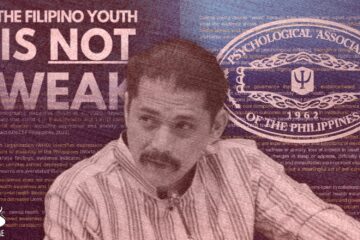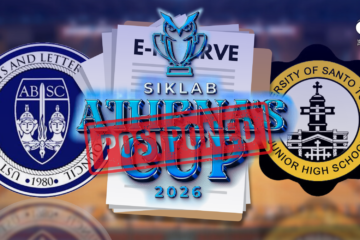
PENALTIES ON minor campaign offenses and the accreditation requirements for parties under the 2011 UST Students’ Elections Code should be reviewed to encourage political participation among students, candidates for the Faculty of Arts and Letters Student Council (ABSC) said.
Franz Rickhayle Salangsang, who is running for ABSC secretary, claimed that the penalties for campaign violations under the elections code are “disproportionate” and “unjust.”
She quoted the Faculty of Arts and Letters Commission on Elections (AB Comelec) as saying that the number of offenses was the “sole basis” for the disqualification of ABSC candidates rather than the severity of their violations.
“We need to revise this specific provision of the election code so that we don’t automatically lead students to disqualifications, especially if their committed offenses are really minor,” Salangsang said in an interview for The Flame TV: ABSC Elections 2025 Edition.
Last elections, the proclamation of three out of five winners of the ABSC polls were suspended after they were temporarily disqualified for campaign violations.
Their violations included posting on a non-campaign day, failure to remove electronic campaign materials before the day of elections and failure to submit the required uniform resource locators or URLs, of their approved campaign materials on time.
Salangsang also pushed for the recognition of “abstain” votes, arguing that having no power to abstain discourages voters’ electoral participation since their decision to turn down candidates they deem unfit for office is not acknowledged.
“If you do not want to vote for a candidate and you don’t have the formal power to do so, it becomes very discouraging. It’s like you are trying to build a council that won’t even be effective,” she said.
“If they don’t consider abstaining as a legitimate vote, then that wouldn’t be respectful of our rights to vote.”
Provisions on abstain votes were not legitimized in both the ABSC Constitution and the student elections code. The abstain vote was also not included in this year’s ABSC ballots.
Consultations on possible revisions to the election code started in February.
The proposed 2025 poll code mentioned the abstain vote and defined it as “voter’s dissatisfaction with the choice of candidates” and “refusal” to mandate the person running for office.
Angela Fiona Palaya who is eyeing the ABSC presidency, said the accreditation requirements for political parties’ should be amended and strengthened as the present electoral process forces aspiring student leaders to run independently.
“It really reflects why student and political participation has been decreasing because they (candidates) are aware of the possible outcome or election process if they ran independently,” she said.
ABSC candidate for public relations officer King Daenielle Manlapaz attributed the decline of parties and the drop in students’ participation to the Comelec’s handling of political organizations.
“Why are we wondering that only four or three students filed their candidacy? That is where we’ll see the absence of political parties,” Manlapaz said during the AB Comelec’s Miting de Avance on April 4.
“We can see or read a lot of information that the essence and presence of political parties are gradually decreasing. These political parties really serve as the heart of student engagement, especially during elections.”
All the three candidates vying for ABSC posts ran independently as no political party participated in this year’s elections.
Both Manlapaz and Palaya said the lack of resources and support system made campaigning more challenging for independent candidates.
“When I observed that political parties are slowly disappearing and none were accredited this year, as a student, I initially felt discouraged because I was thinking about ‘What about my [campaign] resources? What about my manpower for the campaign?’” Manlapaz said.
“It’s not easy for independent candidates to solely take care of the campaigns and materials they need,” Palaya said.
Last year, only one political party was accredited, while another one was suspended due to its failure to garner at least 35 members required by the election code.
Vacant seats
With only three bets vying for ABSC posts this year, Manlapaz proposed the early holding of special elections to avoid prolonged vacancies in the council. He claimed that the vacancies have compromised the outgoing executive board’s performance of its roles and responsibilities.
Four out of seven positions of the ABSC’s outgoing executive board remained unoccupied even with the appointment of Communication sophomore Mari Angelo Moredo, who recently withdrew his candidacy for president this election, as officer-in-charge of the Office of the Secretary last January.
The positions of president and treasurer were filled in by the officials proclaimed after the previous election.
Communication senior Kevin Christian Crisolo, who ran for internal vice president last year, was promoted to acting president last December. Asian Studies junior Naniela Nicole Lagunsad, who was proclaimed the winning candidate for treasurer, occupied the post.
Under Article 1, Section 9 of the proposed 2025 student elections code, special elections for vacancies should be held 15 school days after the declaration of an election failure.
According to Manlapaz, the AB Comelec should have conducted an election since it was among its responsibilities.
“Instead of conducting a special election, the legislative board or the Board of Majors was given the authority [by the AB Comelec] to select an officer-in-charge and to fulfill the responsibilities,” he said.
The aspiring ABSC public relations officer said the poll body made a good move given the time constraints, but the Artlets should have taken part in the filling in of vacant posts.
“It still lacked student consultation or was not gathered by majority votes,” he said.
The AB Board of Majors, composed of the executive heads of the faculty’s 13 societies, served as the appointments committee during the special elections for officers-in-charge.
The onsite voting period started on April 7 and will end on April 12. The proclamation of elected candidates will be held on the last day of the voting. F – Kayla Pauline Gonzalez and Veancy Palad



